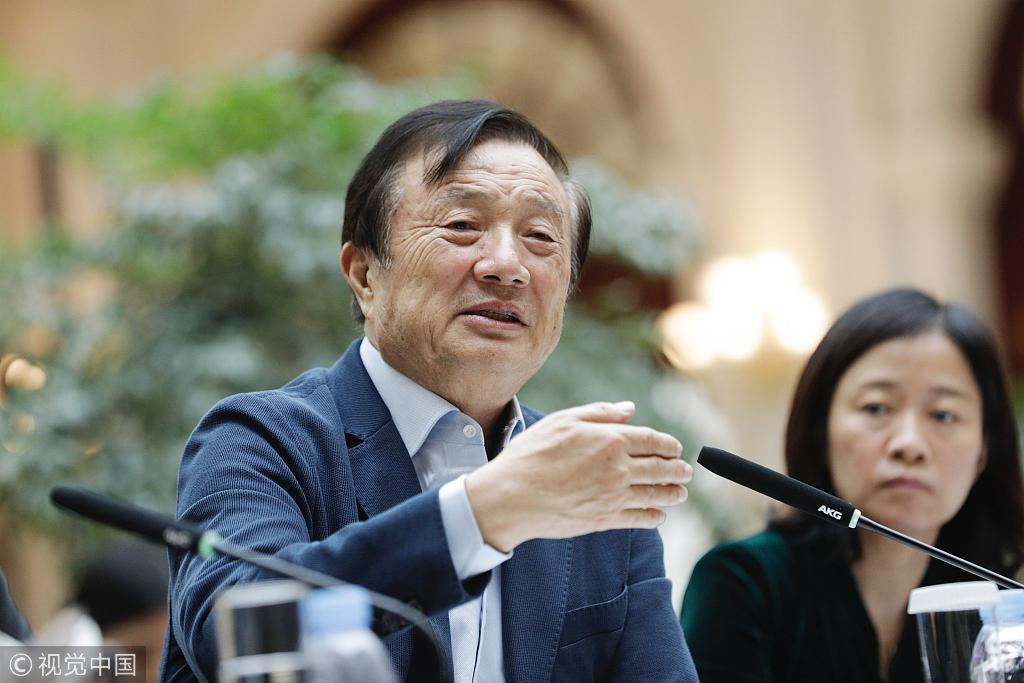
Opinion
10:46, 10-Jun-2019
U.S. request for Huawei ban poorly thought through
Tom Fowdy

Editor's Note: Tom Fowdy is a British political and international relations analyst and a graduate of Durham and Oxford universities. He writes on topics pertaining to China, the DPRK, Britain, and the United States. The article reflects the author's opinion, and not necessarily the views of CGTN.
Acting U.S. budget chief Russell Vought this week sent a letter addressed to Vice President Mike Pence as well as nine members of Congress requesting a delay in the U.S. government ban of Chinese telecommunications firm Huawei, detailing that the rapid implementation of the ban would pose dramatic costs on the country's ability to purchase equipment from local contractors, citing risks of a “dramatic reduction” in the existing timescale. The secretary further stated in the letter that such decisions should be thought through carefully and that a two-year delay would “allow additional time to think through the associated potential impacts and possible solutions.” It also recommended a greater voice for suppliers to raise issues about the collateral damage caused by the ban.
The fact that the members of the Trump administration itself have doubts about the President's decision-making pertaining to Huawei is an indication that the blacklisting of the firm in May was a poorly contemplated, impulsive and abrasive decision with little regards to the consequences. Despite the all-out assault on the company by the White House, Huawei's products have in fact formed a critical part of American telecommunications infrastructure for smaller providers covering rural areas, acting as a cost-effective option. The sudden outright ban on new products from the Shenzhen firm now is set to place soaring costs upon such providers, with no warnings, contingency plans or support in place. Thus in the midst of a poor decision, Vought is asking in the administration to reconsider its actions in a more sensible manner.

Workers sit at the Huawei stand at the Mobile Expo in Bangkok, Thailand, May 31, 2019. /VCG Photo
Workers sit at the Huawei stand at the Mobile Expo in Bangkok, Thailand, May 31, 2019. /VCG Photo
Prior to the Trump administration's actions, Huawei was, in fact, a major player in the American telecommunications industry for its competitive, low cost and innovative equipment. For smaller providers, especially those in rural areas, the Shenzhen firm's products proved to be incredibly useful. As Vought's letter also notes, Huawei's parts further allowed providers to build infrastructure and sell it to the U.S. federal government, in turn keeping prices down for the taxpayer. Beyond all the hysteria stemming from Washington, there is no denying that the company was popular, convenient and also necessary in the role that it played.
The White House, however, did not care about that. Fearing a displacement of American unilateral hegemony within global technology chains, the Presidency set out with the goal of purposefully attempting to ruin Huawei by defiling its brand name with unfounded accusations of espionage and criminality, whilst also moving to remove its presence from the United States through a series of executive measures as they escalated a trade war with China.
First, universities would be banned from researching with Huawei under the national defense authorization act (2018). Afterward, federal government agencies would be banned from purchasing Huawei equipment under the 2020 Pentagon Spending plan and then finally, in May, the administration listed the company as an “entity” and effectively blacklisted it from all technology-related transactions within the United States. In every area, the White House single-handedly ended the company's business within America, the “threat” narrative covering deeply political motivations.

Ren Zhengfei (L), founder and CEO of Huawei Technologies Co., speaks during an interview at the company's headquarters in Shenzhen, China, January 15, 2019. /VCG Photo
Ren Zhengfei (L), founder and CEO of Huawei Technologies Co., speaks during an interview at the company's headquarters in Shenzhen, China, January 15, 2019. /VCG Photo
Yet in doing so, the Trump administration did not consult the telecommunications industry on were the costs, and those costs are high. By removing the primary source of equipment for smaller American telecommunications providers, the price of replacing Huawei gear is set to be staggering. One report from Reuters prior to the ban placed it at an estimated 8 billion U.S. dollars. In addition, as Vought's letter warns, the ban also risks creating a shortage of equipment for U.S. federal government agencies which in turn will see a staggering increase in costs.
As a result, Russell Vought has decided to publicly question the logic and consideration of the White House in forcing through such measures abruptly. As the budget chief, his role is to offer advice to the executive in overseeing the federal budget which is presented to Congress. Given this, he has first-hand access to all data and analysis pertaining to costs and spending within the U.S. government. In turn, this means he cannot ignore the aftermath of the Huawei ban and its consequences for not only federal spending but providers themselves. As a result, in very diplomatic terms, he has recommended a delay and urged the administration to consider the fallout.
In summary, this reveals a wider message: The outright Huawei ban was reckless and will, in the long run, prove to be costly to the U.S. telecommunications industry and infrastructure. The Trump administration effectively decided to declare war on a company which many were dependent upon throughout not only the telecommunications industry, but the broader tech sphere, with no regards for the consequences whatsoever. The broader “threat” narrative has been convincing to the point it has shielded them from adequate scrutiny, yet this does not mean that the impact does not exist.
(If you want to contribute and have specific expertise, please contact us at opinions@cgtn.com.)

SITEMAP
Copyright © 2018 CGTN. Beijing ICP prepared NO.16065310-3
Copyright © 2018 CGTN. Beijing ICP prepared NO.16065310-3